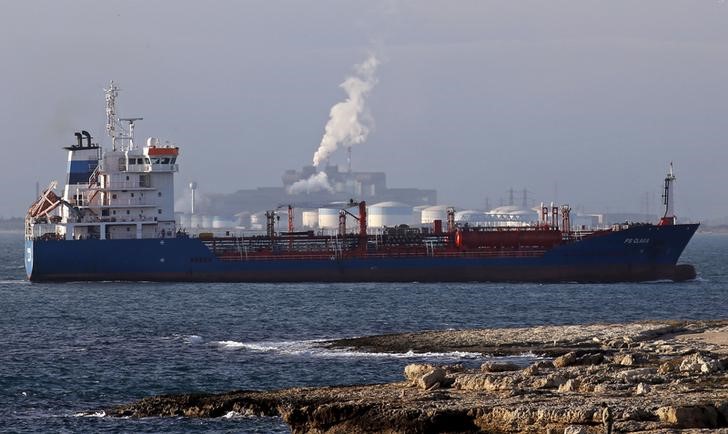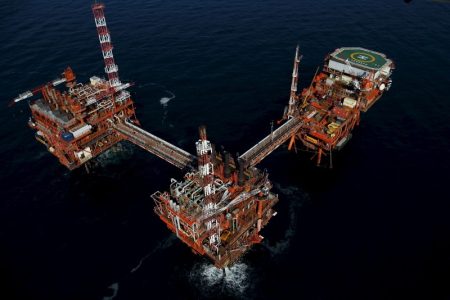By Nadine Awadalla and Terje Solsvik
DUBAI/OSLO (Reuters) -Yemen’s Houthis said on Tuesday they carried out a military operation against a Norwegian commercial tanker in their latest protest against Israel’s bombardment of Gaza, underlining the risks of a conflict that has shaken the Middle East.
The Iran-aligned group hit the tanker, the STRINDA, with a rocket because it was delivering to an Israeli terminal and after its crew ignored all warnings, Houthi military spokesperson Yehia Sarea said in a statement.
But the tanker’s owner, Norway’s Mowinckel Chemical Tankers, said the vessel was headed to Italy with a cargo of palm oil to be used in biofuels. It was not planning to stop in Israel, a company’s spokesperson told Reuters.
The Houthis have waded into the Israel-Hamas conflict – which has spread around the region since Oct. 7 – attacking vessels in vital shipping lanes and firing drones and missiles at Israel more than 1,000 miles from their seat of power in the Yemeni capital of Sanaa.
On Saturday, they said they would target all ships heading to Israel, regardless of their nationality, and warned international shipping companies against dealing with Israeli ports.
The Gaza conflict has already spread to other parts of the region, with Israel and Lebanon’s Hezbollah trading fire and Iranian-backed militias attacking Iraqi bases that hold American forces.
French frigate FREMM Languedoc intercepted and destroyed a drone that was threatening the STRINDA in a complex aerial attack originating from Yemen, the French defence ministry said in a statement on Tuesday.
It said the attack had taken place in the evening of Monday Dec. 11 and had caused a fire on board the tanker, which was sailing under the Norwegian flag.
The STRINDA had loaded vegetable oil and biofuels in Malaysia and was headed for Venice, data from shiptracking firm Kpler showed.
Houthi officials did not immediately respond to a request for comment. There was no immediate comment from the Israeli government.
The Houthi spokesman vowed the group would continue blocking ships heading to Israeli ports until Israel allows the entry of food and medical aid into the Gaza Strip.
Norway’s deputy foreign minister Eivind Vad Petersson said the attack was unacceptable.
“Norway condemns in the strongest possible terms all attacks on civilian shipping,” he said in a statement.
The attack took place about 60 nautical miles (111 km) north of the Bab al-Mandab Strait connecting the Red Sea and the Gulf of Aden at about 2100 GMT, a U.S. official told Reuters. A second U.S. official said the STRINDA was able to move under its own power in the hours after the attack.
“There were no U.S. ships in the vicinity at the time of the attack, but the (U.S. Navy destroyer) USS MASON responded to the M/T STRINDA’s mayday call and is currently rendering assistance,” the U.S. military’s Central Command, which oversees American forces in the Middle East, said in a statement posted on social media platform X.
The attack caused a fire and damage but no casualties, the U.S. military said in a statement.
“AXIS OF RESISTANCE”
The Houthi spokesman said that the group had managed to obstruct the passage of several ships in recent days, acting in support of the Palestinians.
The tanker’s manager, Hansa Tankers, could not be immediately reached for comment outside office hours.
The Houthis are one of several groups in the Iran-aligned “Axis of Resistance” that have been taking aim at Israeli and U.S. targets since their Palestinian ally Hamas attacked Israel.
During the first week of December, three commercial vessels came under attack in international waters, prompting a U.S. Navy destroyer to intervene.
Last month the Houthis also seized a British-owned cargo ship that had links with an Israeli company.
The United States and Britain have condemned the attacks on shipping, blaming Iran for its role in supporting the Houthis. Tehran says its allies make their decisions independently.
Saudi Arabia has asked the United States to show restraint in responding to the attacks.
Read the full article here















